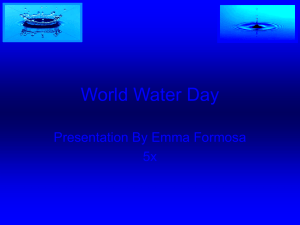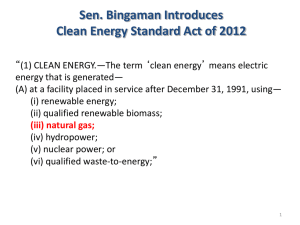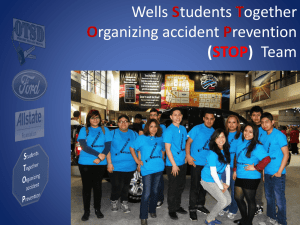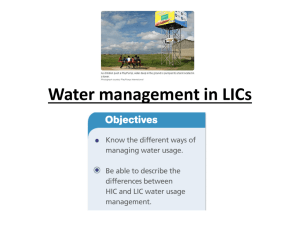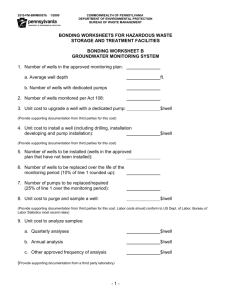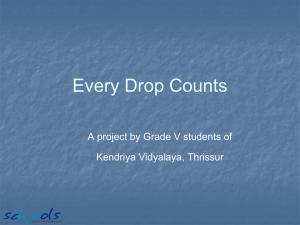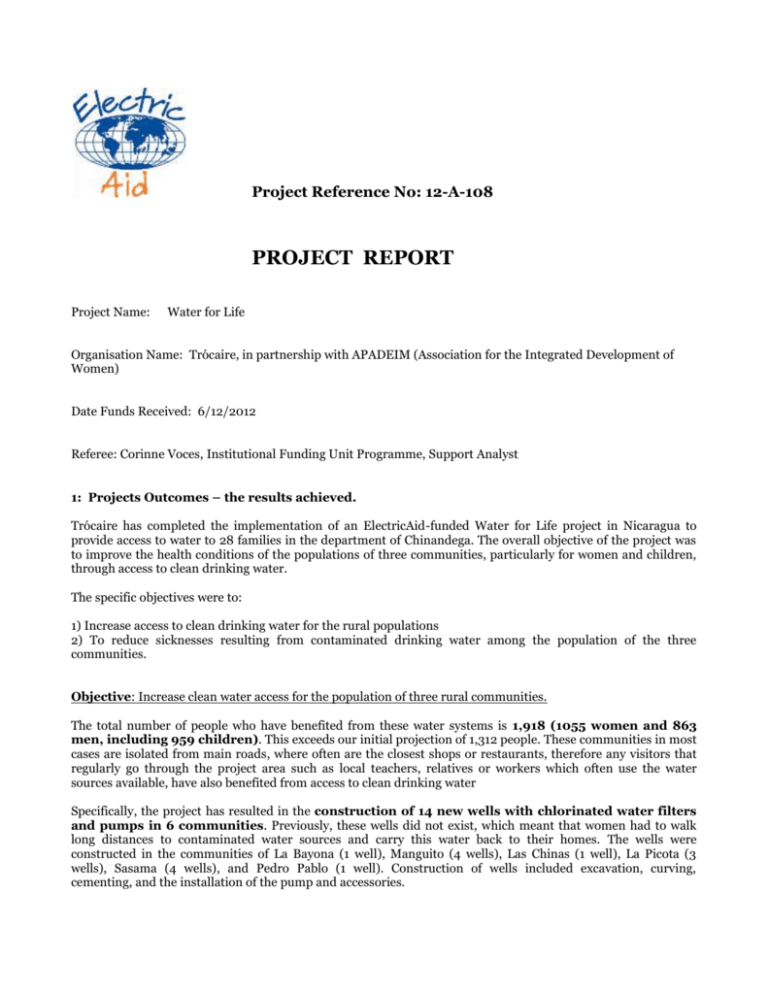
Project Reference No: 12-A-108
PROJECT REPORT
Project Name:
Water for Life
Organisation Name: Trócaire, in partnership with APADEIM (Association for the Integrated Development of
Women)
Date Funds Received: 6/12/2012
Referee: Corinne Voces, Institutional Funding Unit Programme, Support Analyst
1: Projects Outcomes – the results achieved.
Trócaire has completed the implementation of an ElectricAid-funded Water for Life project in Nicaragua to
provide access to water to 28 families in the department of Chinandega. The overall objective of the project was
to improve the health conditions of the populations of three communities, particularly for women and children,
through access to clean drinking water.
The specific objectives were to:
1) Increase access to clean drinking water for the rural populations
2) To reduce sicknesses resulting from contaminated drinking water among the population of the three
communities.
Objective: Increase clean water access for the population of three rural communities.
The total number of people who have benefited from these water systems is 1,918 (1055 women and 863
men, including 959 children). This exceeds our initial projection of 1,312 people. These communities in most
cases are isolated from main roads, where often are the closest shops or restaurants, therefore any visitors that
regularly go through the project area such as local teachers, relatives or workers which often use the water
sources available, have also benefited from access to clean drinking water
Specifically, the project has resulted in the construction of 14 new wells with chlorinated water filters
and pumps in 6 communities. Previously, these wells did not exist, which meant that women had to walk
long distances to contaminated water sources and carry this water back to their homes. The wells were
constructed in the communities of La Bayona (1 well), Manguito (4 wells), Las Chinas (1 well), La Picota (3
wells), Sasama (4 wells), and Pedro Pablo (1 well). Construction of wells included excavation, curving,
cementing, and the installation of the pump and accessories.
The Water for Life project resulted in the rehabilitation of 14 wells in 5 communities: Paniquines (1
rehabilitated well), La Bayona (5 rehabilitated wells), Manguito (3 rehabilitated wells), La Picota (1 rehabilitated
well) and Pedro Pablo (4 rehabilitated wells).
Further, 37 tanks and 60 kitchen filters for water storage and cleansing were delivered to 10
communities. These resources will ensure that drinking water can be stored and cleansed for future use.
Objective: Reduction of waterbone diseases among the population of three rural communities
Before the project, certain communities had access to water sources that were found to be contaminated with
mud, arsenic and/or faecal matter. Families in these communities reported instances of waterborne sickness, as
well as ailments such as diarrhoea and stomach cramping. Scientific testing of the new and rehabilitated water
sources has proven that the water is pure and drinkable, in comparison to previous studies that proved water
sources in the communities were contaminated and not fit for human consumption. Through discussion groups,
beneficiary families have reported a noticeable reduction in stomach ailments and diarrhoea, which result from
drinking contaminated water.
Traditional water extracting methods often require dragging the bucket or recipient along the sides of the well ,
this practice often picks along the way sediments and other remains, while also returning some sediments to the
water , thus with ongoing use promoting further the contamination of the water. The new and rehabilitated wells
disturb less the water source and allows for the sediments to settle ,which also facilitates cleaner water sources.
Other outcomes achieved:
Walking Distance and Exposed Risk to Sexual Violence Reduced
Thanks to the facilitated access to community wells, 738 women (629 adults, 67 adolescent women and
32 girls from the communities of la Bayona, Capirano and Chorreras no longer have to make the
treks of up to 2 to 4 kilometers, depending on the community, to obtain water, which they had to haul back
to their homes. Now, the women’s walking distance has been reduced to a range of 500 meters to 1
kilometer, which decreases the amount of walking time spent, from 1-4 hours per day to a range of 30 minutes
to one hour, depending on proximity to the water source. This frees the amount of time these women have to
dedicate themselves to other activities, including participation in meetings to work on productive activities,
medical check-ups, capacity building, study time, and sales.
Furthermore, because this trek has been eliminated from the beneficiaries’ lives, the women have reported that
they feel safer than they were before the project. They report that the risk of sexual abuse or gender-based
violence during these long trips to the water points has been reduced, as the routes are now different,
shorter, and they do not have to make as many trips as they had to previously.
Women Empowered
Trócaire also offered financial support to ensure that women were trained in the installation, management and
maintenance of wells to ensure that the wells continue to offer the benefit of clean water to the target
communities in the long-run. Overall, 38 women have been trained in the installation, management
and maintenance of the wells and filters.
Further, 6 water committees made up entirely of women were formed and are currently operation with a
work plan in 7 communities (Pedro Pablo, La Bayona, Manguito, Chorreras, La Picota, Las Chinas and Sasama).
These committees give women a direct say in management of the resource of water, which has strengthened the
sense of community leadership and the need to have a fair and equal distribution of resources, so many people
will benefit from safe water access.
2: Financial Accountability – how the money was spent.
(Include here a brief financial account of the spending of the ElectricAid funding. Also account for any unspent
balance. Receipts as appropriate should be attached.)
Communities access to
drinking water
Budgeted
Amount in €
Euros
Total
expenditure
Amount
covered by
ElectricAid
Amount
covered by
Trocarie
Drilling of 23 wells
1,306.00
1,349.54
1,306.00
43.54
Purchase of 23 rope pumps
1,640.00
1,694.67
1,640.00
54.67
Installation of 23 rope pumps
2,796.00
2,889.21
2,796.00
93.21
Materials to build 23 wellcaps
3,727.00
3,851.25
3,727.00
124.25
Materials for construction of
23 wellscreens
1,864.00
1,926.15
1,864.00
62.15
Labour payment for
construction of well caps and
screens
1,864.00
1,926.15
1,864.00
62.15
Purchase of 60 artisanal filters
1,174.00
1,213.14
1,174.00
39.14
Purchase of 37 water storage
tanks of 500 Liters
2,698.00
2,787.95
2,698.00
89.95
Materials for transportation
to communities
519.00
519.00
0.00
519.00
Team transportation to
communities
687.00
687.00
0.00
687.00
18,275.00
18,844.06
17,069.00
Training in water and sanitation, community hygiene
1,775.06
Sub-Total
Snacks for training and
lunches
1,203.00
1,700.00
0.00
Materials
300.00
300.00
0.00
Monitoring Costs
200.00
200.00
0.00
1,700.00
300.00
200.00
900.00
0.00
900.00
2,000.00
0.00
2,000.00
Transportation costs for
construction of wells
Water Analysis
TOTAL
€ 19,978.00
€
23,944.06
€
17,069.00
€
6,875.06
Notes:
1 Training was carried out in water management, sanitation and community hygiene, as well as care of water
sources. A study of the water was also carried out to measure the extent of contamination and number of
contaminants in the water. All these activities also required refreshments during training, as well as fuel to cover
transportation costs. All additional costs outside of the planned budget were fully covered by Trócaire.
2 As budgeted the community also contributed to the project with labour for construction and rehabilitating the
water wells, which represented a total cost of €6,762
3: Project Process Narrative – how the project was
implemented or progressed to date.
Project Aim:
The overall aim of the project was to improve the health conditions of the populations of three communities,
particularly for women and children, through access to clean drinking water.
Project Evaluation:
The technical team of APADEIM, which is trained in water management, carried out monitoring, foll0wthrough, and evaluation of all of the activities of the project, implementing the operative plan. This consisted of a
chemical and bacteriological analysis of water, as well as an analysis of the feasibility of construction materials.
Local soil has a high content of organic material as well as porosity qualities, so does not adhere as well to
cement like other type of soils and the constructions wouldn’t last as long. For the project this meant that other
type of sand was to be sourced from other sites, which increased the original transport costs.
During the implementation of the project, APADEIM’s personnel visited the communities on a weekly basis to
oversee the delivery of materials and the construction of the well. Trócaire performed three sight visits to oversee
project development and maintained constant communication with APADEIM through telephone and email
correspondence. Due to the high demand for access to clean water and as to reach a higher number of
populations, the wells were designed for community use, not for the use of individual families. This helps to
promote wider use of the resource as well encouraging communities to be organised and ensure the safe keeping
of the water wells in the future.
APADEIM has also carried out monitoring and evaluations with the water committees to ensure that they are
properly organized, that they have developed operational plans, and that they are operating in an effective and
efficient manner. Water committees established commitments regarding the maintenance of wells and filters to
be performed six months, through the monetary contributions of the beneficiaries. Furthermore, local women
will oversee the well’s operation and maintenance, as 38 women have received technical training to provide them
with skills in the installation, repair and maintenance of pumps.
Results Reported:
The results of the Water for Life project include the following:
Result 1: Access to drinking water facilitated for families in target communities:
Access to clean drinking water facilitated for 1,918 people (1055 women and 863 men, including 959
children).
The excavation and construction of 14 new wells in 6 rural communities.
The rehabilitation of 14 wells in 5 rural communities.
The construction of 28 paths in 7 rural communities
The installation of 23 rope pumps in 7 rural communities.
The purchasing and distribution of 37 water storage tanks in 9 rural communities
The purchasing and distribution of 60 water filters in 10 rural communities
Result 2: Health of beneficiary families in target communities improved (reduction in stomach ailments and
diarrhoea) as a result of drinking from clean sources of water.
1,918 people (1055 women and 863 men, including 959 children) with improved health and reduced risk
in water-related stomach ailments/diarrhoea.
Picture above shows one of the rehabilitated wells in La Bayona, as well as the new pump and the water filter.
The first water filtered is used in the house for washing, bathing etc, the second filter helps to purify the water
further so it can be used for drinking. Traditionally people in the area had to access water from wells using
pulleys ( see circled in the picture) and depending the force required and if available, animal traction or human
traction, like in the picture on the left where a boy is manually extracting water from the well.
Result 3: Women’s risk of falling victim to sexual violence has been reduced through the elimination of the long
walks that were previously required to access water points.
738 women (629 adults, 67 adolescent women and 32 girls from the communities of la Bayona, Capirano
and Chorreras no longer have to make the treks of up to 2 to 4 kilometers, with walking distances being
reduced to 500 meters-1 kilometer.
738 women (629 adults, 67 adolescent women and 32 girls from the communities of la Bayona, Capirano
and Chorreras with reduced risk of sexual abuse or gender-based violence as a result of reduced walking
distances.
Result 4: Women have been empowered through training and assuming leadership roles of management and
oversight of the water sources.
38 women trained in the installation, management and maintenance of the wells and filters.
6 water committees made up entirely of women were formed and are currently operation with a work
plan in 7 communities
Challenges Faced:
A few challenges presented themselves during the implementation of the Water for Life project.
1.
Demand for water: The project only addressed approximately 30% of the demand of the local population
of the target communities. A total of 63 wells would be necessary to satisfy this demand. The greatest
difficulty was the selection of the wells to be constructed or rehabilitated as some required more work
than others, but the necessity is often great across all populations. Priority was determined through site
visits, as well as an analysis of water sources through the National Agrarian University (UNA), the
National Engineering University (UNI), and the Ministry of Health.
Their need for safe drinking water becomes more urgent as result of the alarming analysis that shows
chemical contamination. Nicaragua produces a large amount of sugar cane; both for human and animal
consumption, agricultural companies rely heavily on dangerous chemical products, which in cases are
banned internationally, but often end up contaminating water sources. Those who live near the
plantations are forced to drink from these sources due to lack of safe alternatives.
2. Delivery of materials: The transferring of materials was a particular challenge, especially in very remote
communities that were difficult to access by vehicle and are located from 8 to 60 kilometres away from
El Viejo, the nearest urban centre. A consultant was hired to oversee the effective transportation of these
materials.
3. Gender dynamics: Men in certain communities responded negatively to the women-run water
committees, particularly those men who are not participating in Trócaire’s Prevention of Gender Based
Violence Programme in the communities. To mitigate this risk, Trócaire will continue to offer gender
training in the target communities. Furthermore, the committees have expressed interest in
incorporating men into their work, so that caring for the resource of water will be a responsibility to be
shared by both sexes and both men and women understand the need for safekeeping the wells in order
no to recur to previous health issues.
Impact:
Through the Water for Life Project, 28 families from 6 communities now share clean drinking water from their
wells with other families in the communities.
This includes 150 boys and girls who study at 2 schools that previously did not have access to water, as
they were unable to fetch it themselves without the use of a horse as force power.
Women from six communities have reduced the amount of domestic work required in fetching water.
The number of infectious sicknesses in boys, girls, and adolescents has been greatly reduced, thanks to
the new, clean sources of drinking water.
The children are also more secure both at home and in the schools since the new and rehabilitated water
sources are properly sealed, so as to prevent contamination and the risk of falling into the wells. Women
have also greatly reduced physical risks, their susceptibility to sexual favours from men during the long
walks to and from water sources
Empowered women to have a voice in their community that would open new roles in their development.
“We care for our families and we want to give them the best we can, this is a share responsibility
between men and women”.
The following are two case studies that illustrate the impact of the Water for Life project on a personal level.
Maria Aydee Neyra, Mother of four in El Manguito
Chinandega, Nicaragua
Maria lives in a small home made of wood and palm
leaves in the small community of Manguito in the
Department of Chinandega in northern Nicaragua. She
is a housewife and her husband is a subsistence farmer
who produces crops for the family’s consumption. They
have four children – three daughters (ages 3, 6 and 12)
and one 13-year-old son.
Prior to the ElectricAid project, Maria and her family
had access to an open well that was in poor condition.
According to tests that were carried out by the National
Agrarian University (UNA), the National Engineering
University (UNI), and the Ministry of Health, the water source was contaminated and tested for high levels of
arsenic. Arsenic poisoning affects the lungs, skin, kidneys and liver and causes a variety of ailments, including
diarrhoea, drowsiness, vomiting, blood in the urine, cramping, hair loss, stomach pain, convulsions and even
comas or death.
Maria reported that her children had suffered from cramping and diarrhoea prior the installation of the new
well, but ever since receiving access to clean water, those ailments have subsided. “The water is completely
different,” Maria said, her eyes wide with appreciation. “Before we were drinking brown and muddy water
because we had no other choice. Now it is clear and clean.”
The new well is built with a chlorinated water filter to ensure that the water is fit for human consumption. The
well is also sealed, which prevents contamination while ensuring the safety of her children. “I was afraid to leave
the well before,” Maria said. “It was open, and I was nervous that one of my kids might fall in.” Maria also told us
that she had to strap the bands that pulled up the buckets of water around her waist, using a pulley system and
her body to help pull the water, increasing the risk of physical injury.
The well serves 4 other families in the Manguito community. A water committee made up of 6 women oversees
the well, as well as maintenance and repairs if they become necessary into the future.
Fatima Silva, Mother of two and community leader in La
Bayona, Chinandega, Nicaragua
The first thing the outspoken and energetic Fatima Silva,
community leader in La Bayona, told us when we met her
was, “Our dreams have been realized. We are very thankful
to Trócaire and ElectricAid for giving us high-quality water.”
Fatima is the mother of two children. Before the Water for
Life project, she and her family had access to an open well
that was falling apart. The water had to be pulled out
manually and would be full of mud. Tests carried out by the
National Agrarian University (UNA), the National
Engineering University (UNI), and the Ministry of Health
found that the unsealed water was contaminated with faecal matter.
Fatima benefits from one of the 6 wells that the ElectricAid-funded project built in the community of La Bayona,
which is one of the poorest communities in Nicaragua. Houses are made of wood and scraps of metal or tarp. In a
zone that is heavily affected by Dengue, the open houses offer little to no protection from the threat of
mosquitoes.
The wells have provided the community members with access to clean drinking water for the first time in their
lives. The well on Fatima’s property serves 4 other families, but she says that there are other families in the
surrounding area that come to access the water. “We share the water,” Fatima says. “We have enough, and the
water is for everyone.”
Before the project, Fatima’s children suffered more often from stomach sicknesses and diarrhoea. Now, she notes
a difference in their health, which she attributes to the chlorinated filter and the well’s seal.
Fatima, who is an active participant in Trócaire’s prevention of gender-based violence programme, forms part of
the water committee that manages the new wells, along with 4 other women. Together, they are in charge of
protecting the resource and organizing a response to the repair the wells and pumps if they ever stop working.
“Some men have been critical of the women’s leadership of the committee,” Fatima says. “They think we are
trying to take total control of things, but those are just the men who don’t form part of the gender training we
receive from APADEIM. They don’t all understand that we can be leaders too. That we have voices.”
“Water is life,” Fatima offered with a smile. “Without water, what do we have?”
4: Visual Report – photographs.
University and Health Ministry officials test quality of
previous contaminated water sources in target
communities
Women installing the pumps into one of the
rehabilitated wells in the community of La Bayona.
Women trained in the installation and management of
pumps helped to construct the wells.
Beneficiary Maria Aydee Neyra in front of the
rehabilitated well that serves 5 families in Manguito.
Trócaire and APADEIM officials on a monitoring and
evaluation visit of the beneficiary communities in
September 2013 after project completion.




